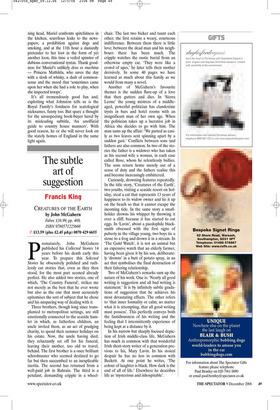The subtle art of suggestion
Francis King
CREATURES OF THE EARTH by John McGahern Faber, £16.99, pp. 408, ISBN 9780571225668 ✆ £13.59 (plus £2.45 p&p) 0870 429 6655 Prematurely, John McGahern published his Collected Stories 14 years before his death early this year. To prepare this Selected Stories he obsessively polished and ruthlessly cut stories that, even as they then stood, for the most part seemed already perfect. He also added two stories, one of which, ‘The Country Funeral’, strikes me not merely as the best that he ever wrote but also as the one that most accurately epitomises the sort of subject that he chose and his unsparing way of dealing with it.
Three brothers, though long since transplanted to metropolitan settings, are still emotionally connected to the seaside hamlet in which, as fatherless children, an uncle invited them, as an act of grudging charity, to spend their summer holidays on his estate. Now, the uncle having died, they reluctantly set off for his funeral, leaving their mother, too old to travel, behind. The first brother is a once brilliant schoolmaster who seemed destined to go far but then succumbed to an inexplicable inertia. The second has returned from a well-paid job in Bahrain. The third is a petulant, demanding cripple in a wheel chair. The last two bicker and taunt each other; the first retains a weary, courteous indifference. Between them there is little love; between the dead man and his neighbours there has been much. The cripple watches the rustic burial from an otherwise empty car. ‘They were like a crowd of apes,’ he later tells their mother derisively. In some 40 pages we have learned as much about this family as we would from many a novel.
Another of McGahern’s favourite themes is the sudden flare-up of a love that then gutters and dies. In ‘Sierra Leone’ the young mistress of a middleaged, powerful politician has clandestine trysts in bars and hotel rooms with an insignificant man of her own age. When the politician takes up a lucrative job in Africa she decides to go with him. The man sums up the affair: ‘We parted as easily as two leaves sent spinning apart by a sudden gust.’ Conflicts between sons and fathers are also common. In two of the stories the father is a widower who has taken as his second wife a woman, in each case called Rose, whom he relentlessly bullies. The sons return home merely out of a sense of duty and the fathers realise this and become increasingly embittered.
Curiously, drowning features repeatedly. In the title story, ‘Creatures of the Earth’, two youths, visiting a seaside resort on holiday, steal a cat that represents 13 years of happiness to its widow owner and tie it up on the beach so that it cannot escape the incoming tide. In the same story a smallholder drowns his whippet by throwing it over a cliff, because it has started to eat eggs. In ‘Lavin’, about a paedophile blacksmith obsessed with the first signs of puberty in the village young, two boys tie a stone to a frog and drown it in a stream. In ‘The Gold Watch’, it is not an animal but an expensive watch that an elderly farmer, having been given it by his son, deliberately ‘drowns’ in a butt of potato spray, in an act that symbolises the final destruction of their faltering relationship.
Two of McGahern’s remarks sum up the nature of his work. One is: ‘Nearly all good writing is suggestion and all bad writing is statement.’ It is by infinitely subtle gradations of suggestion that he achieves his most devastating effects. The other refers to ‘that inner formality or calm, no matter what it is attempting, that all good writing must possess’. This perfectly conveys both the fastidiousness of his writing and the feeling that I intermittently experience of being kept at a distance by it.
In his narrow but sharply focused depiction of Irish middle-class life, McGahern has much in common with that wonderful Irish short-story writer of a generation previous to his, Mary Lavin. In his stoical despair he has no less in common with Beckett. At one point he writes, ‘The colour of laughter is black. How dark is the end of all of life.’ Elsewhere he describes life as ‘mysterious and inhospitable’.


























































































 Previous page
Previous page